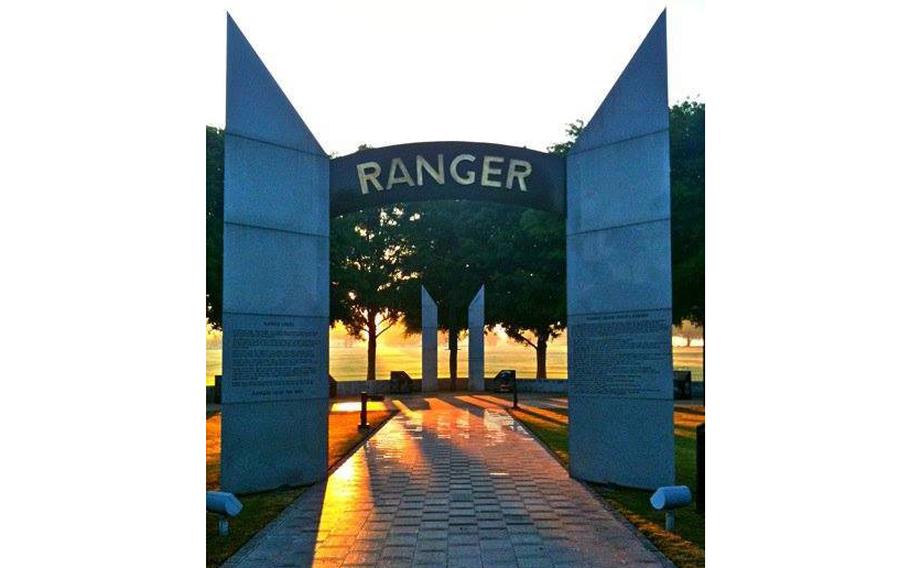
The foundation charged with fundraising and care for the National Ranger Memorial at the Army’s Fort Moore has asked House Republican leaders to reverse the decision to remove some Confederate-linked names from the monument. (National Ranger Foundation/Facebook)
ATLANTA — The foundation charged with fundraising and care for the National Ranger Memorial at the Army’s Fort Moore has asked House Republican leaders to reverse the decision to remove some Confederate-linked names from the monument.
The National Ranger Memorial Foundation wrote it was “deeply troubled” by the removal of three names from the memorial, describing it as ‘the defacement and desecration” of the monument in a May 23 letter to House Speaker Kevin McCarthy, R-Calif., and Rep. Mike Rogers, R-Ala., chairman of the House Armed Services Committee. The Ranger memorial was established in 1992 at Fort Benning, which became Fort Moore last month, to honor past and present Rangers and includes thousands of names on the monument and on brick pavers around it.
In the letter, signed by more than 100 Ranger veterans including seven retired generals, the foundation said it was opposed to the removal of three of four names ordered to be taken off the memorial: John S. Mosby, George Bowman and Jackson Bowman. It said it agreed with the decision to remove a fourth name, William Quantrill.
The foundation asked the House leaders to step in, accusing Fort Moore leaders of taking a heavy-handed approach to stripping the installation of links to the Confederacy, which Congress ordered in 2020.
“In attempting to address the abominable treatment of our citizens of African descent, Fort Moore leadership has unfortunately taken a one-size-fits-all approach, which is itself abominable treatment of other citizen groups,” the former Rangers wrote in the letter that the foundation published Sunday on its website.
Fort Moore officials said Tuesday that they were simply following orders.
The decision to remove some names from the memorial comes from the congressional mandate to strip names and items honoring Confederates from Defense Department installations and inventory. That mandate was included in the 2021 National Defense Authorization Act, the annual law the sets Pentagon policy and spending priorities. That law established the so-called Naming Commission, which spent more than a year studying the issue and eventually called for the removal of items and the renaming of nine Army installations.
In its September 2022 report, the Naming Commission identified the four names to be removed from the Ranger Memorial, among hundreds of other names and items to be removed at other locations at the former Fort Benning. Last October, Defense Secretary Lloyd Austin ordered all entities within the Defense Department to implement the changes recommended by the commission by the end of 2023.
Leaders at Fort Moore, which is home to the Army’s Ranger School, the 75th Ranger Regiment’s headquarters, its 3rd Battalion and the annual Best Ranger Competition, said they have worked for months to scrub the installation of items identified by the Naming Commission, including the references to Mosby, the Bowmans and Quantrill.
“In accordance with the William M. (Mac) Thornberry National Defense Authorization Act (NDAA) for Fiscal Year 2021 … and as directed by the secretary of defense, Fort Moore initiated the removal of Ranger memorial assets identified in the Naming Commission’s recommendations,” a Fort Moore spokesperson said in a statement Tuesday. “This work is planned to be complete by Jan. 1, 2024.
“Fort Moore consulted with the National Ranger Memorial Foundation about these actions.”
Nonetheless, the foundation said it was concerned about removing the names Mosby and Bowman and how it could harm their descendants.
“We express grave concern for the impact of this decision on the families of those named, who are being denied the recognition and honor their loved ones earned through their brave service to our country,” the letter reads. “Furthermore, this decision undermines the integrity and significance of the memorial itself, which stands as a symbol of the sacrifice and dedication of our nation’s Rangers.”
The foundation argued Mosby and the Bowmans, despite their Confederate service, should remain.
Mosby was a lawyer who became a Confederate cavalry commander known as the “Gray Ghost” for leading daring raids on federal forces. Mosby joined the Confederate army in 1861 out of loyalty to his family and the state of Virginia even after opposing secession and slavery, he claimed in his memoirs. He later reconciled with U.S. officials, and he served as an assistant U.S. attorney general and U.S. consul to Hong Kong under President Ulysses S. Grant.
The Bowmans were members of a Confederate cavalry troop under Brig. Gen. John Hunt Morgan, known as Morgan’s Raiders, which conducted raids into Indiana, Kentucky, Ohio and West Virginia during the Civil War.
Quantrill led a band of Confederate-aligned guerrilla fighters during the war that led murderous raids on Union-aligned cities. The foundation wrote in its letter that it agreed Quantrill’s name should be removed, writing it believed “past leadership erred in approving its placement at the memorial.”
The foundation also wrote removing the other names from the memorial would “not foster unity within the Ranger community or our nation, nor guarantee equality.”
“We must remember and learn from our history, but we must not erase it,” the group wrote in the letter. “Removing from the Ranger memorial the names of those soldiers who supported the Confederacy but honorably served the United States of America thereafter is an affront to our shared heritage and values as a nation.”